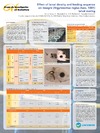Identificador persistente para citar o vincular este elemento:
https://accedacris.ulpgc.es/jspui/handle/10553/5882
| Title: | Effect of larval density and feeding sequence on meagre (Argyrosomus regius Asso, 1801) larval rearing | Authors: | Roo, Javier Hernandez-Cruz, C.M Fernández Palacios, José María Schuchardt, Dominique Borrero, C. |
UNESCO Clasification: | 310502 Piscicultura | Issue Date: | 2006 | Abstract: | Meagre, has been proposed as a candidate for marine finfish diversification on commercial aquaculture (Quémèner, 2002, Mateos, 2007). Despite of the elevated on growing potential, the most important bottleneck of this specie is related to the limited production of fry. Larval rearing of this species, is performed mainly adapting seabream culture techniques with different success (Roo et al., 2007) However, since limited information about the optimal feeding sequences and nutritional requirements of meagre is available, more research is needed on larval rearing protocols and nutrition. Present results (elevated larval growth rate, high survival, short rotifers period) are very promising for a successful implementation at industrial scale, which helps to solve the continues lack of fry of this specie in the Mediterranean and Canary islands. | URI: | https://accedacris.ulpgc.es/handle/10553/5882 | Source: | XII International Symposium on Fish Nutrition & Feeding, 28 May - 1 June 2006, Biarritz, France | Rights: | by-nc-nd |
| Appears in Collections: | Póster de congreso |
Page view(s)
53
checked on Jan 10, 2026
Download(s)
153
checked on Jan 10, 2026
Google ScholarTM
Check
Share
Export metadata
Items in accedaCRIS are protected by copyright, with all rights reserved, unless otherwise indicated.
